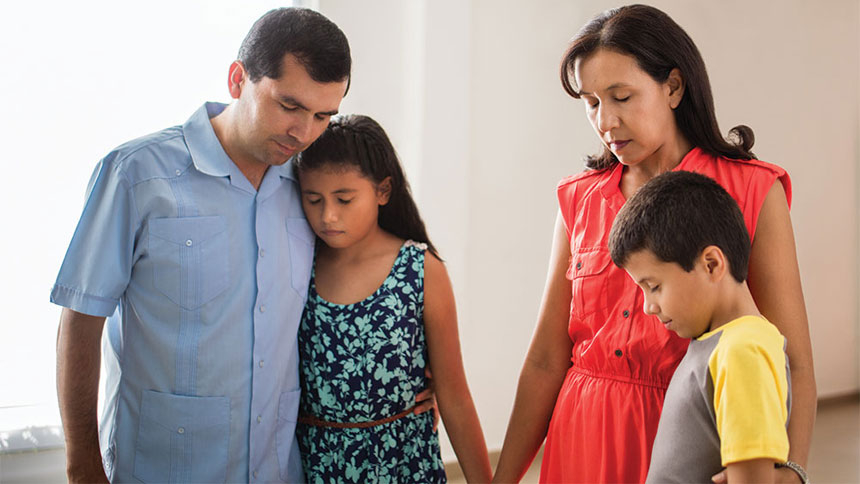
Holy Thursday, Good Friday and Easter are happening this week, and Catholics will be viewing Mass online and participating in their homes. FAITH Catholic introduces readers to how to get the most out of the experience, whether you are watching Mass at your local parish or at the cathedral, the mother church for the diocese.
How to get the most out of Mass online
Preview the televised Masses offered to determine which may be most appropriate for your household.
- Set up a space in your home for prayer/worship. Consider covering a table with a tablecloth or another nice cloth of the season- a liturgical color. Place a Bible, a candle and a cross or crucifix on the table.
- Straighten the space and arrange enough furniture for all.
- Have everyone go to the bathroom, get drinks, wash faces and arrive prepared to attend to the Mass.
- Turn off and remove all devices that can distract from the space.
- Remind everyone that we do not kneel and perform the ritual gestures of Mass while we are watching it, since this does not take the place of attending Mass. But everyone should attend to it prayerfully and make a spiritual communion.
- Before the Mass begins, light the candle.
Catholics encouraged to practice “spiritual Communion” during COVID-19 epidemic
After the Angelus prayer on March 3, Pope Francis invited the faithful “to rediscover and deepen the value of the communion that unites all the members of the Church. United to Christ we are never alone, but we form one single Body, of which He is the Head.”
Pope Francis encouraged those unable to attend church to pray for spiritual Communion, “a practice that is highly recommended when it is not possible to receive the sacrament.” Archbishops and bishops in the U.S. join the pope in inviting the faithful to this practice.
In his encyclical, Ecclesia de Eucharistia, Pope John Paul II explained how the essential role of the Eucharist in uniting us to Christ led to the practice of “spiritual Communion”:
In the Eucharist, “unlike any other sacrament, the mystery [of communion] is so perfect that it brings us to the heights of every good thing: Here is the ultimate goal of every human desire, because here we attain God and God joins himself to us in the most perfect union.”
Precisely for this reason it is good to cultivate in our hearts a constant desire for the sacrament of the Eucharist. This was the origin of the practice of “spiritual Communion,” which has happily been established in the Church for centuries and recommended by saints who were masters of the spiritual life. St. Teresa of Jesus wrote: “When you do not receive Communion and you do not attend Mass, you can make a spiritual Communion, which is a most beneficial practice; by it the love of God will be greatly impressed on you” (Ecclesia de Eucharistia 34:68-70).
What is spiritual Communion?
Spiritual Communion is the practice of desiring union with Jesus Christ in the Holy Eucharist. It is used primarily by individuals who cannot receive holy Communion, such as the ill, the divorced and remarried, and those who have not yet been received into full communion with the Church. St. Thomas Aquinas described it as “an ardent desire to receive Jesus in the most holy sacrament and lovingly embrace him” at a time or in circumstances when we cannot receive him in sacramental Communion.
Act of spiritual Communion
My Jesus,
I believe that you are
present in the Most Holy Sacrament.
I love you above all things, and I desire to receive you into my soul.
Since I cannot at this moment
receive you sacramentally,
come at least spiritually
into my heart. I embrace you
as if you were already there and
unite myself wholly to you.
Never permit me to be
separated from you. Amen.
Saints have encouraged spiritual Communion
“Communion is to the soul like blowing a fire that is beginning to go out, but that has still plenty of hot embers; we blow, and the fire burns again.
“After the reception of the Sacraments, when we feel ourselves slacken in the love of God, let us have recourse at once to spiritual Communion. When we cannot go to the church, let us turn towards the tabernacle; no wall cannot separate us from the good God.” - ST. JOHN VIANNEY
Spiritual Communion is “an ardent desire to receive Jesus in the Holy Sacrament and a loving embrace as though we had already received Him.” - ST. THOMAS AQUINAS
“What a source of grace there is in spiritual Communion! Practice it frequently and you’ll have more presence of God and closer union with him in your life.” - ST. JOSE MARÍA ESCRIVÁ
Pray the Liturgy of the Hours
The Church has another liturgy (public prayer) with which people may be unfamiliar. That is the Liturgy of the Hours, also known as the Divine Office, the daily prayer of the Church. This beautiful liturgy marks the hours of each day and sanctifies the day with prayer. The Hours are a meditative dialogue on the mystery of Christ, using scripture and prayer. Join priests and religious around the world each day, and particularly on Sundays, in praying the Liturgy of the Hours. You can find it at www.ibreviary.com.

